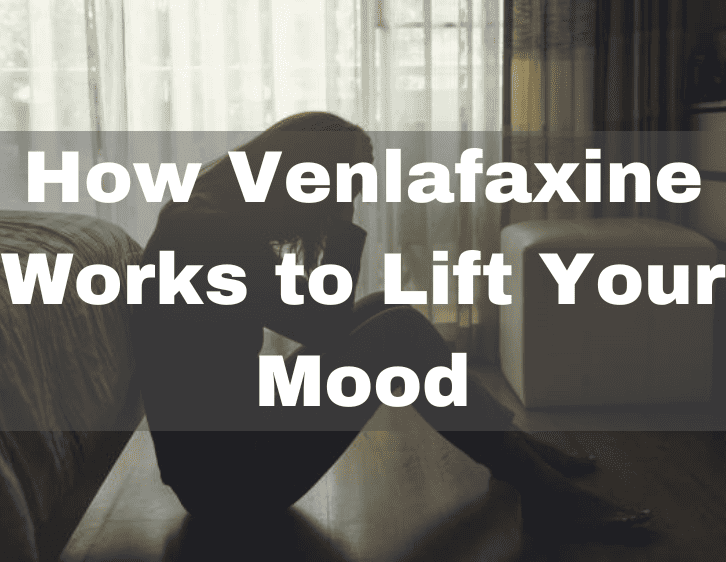It may be pretty important to find the proper medication for anxiety and depression. Effexor, also known as Venlafaxine, is a medication for treating mood disorders that has drawn interest. The reason doctors recommend this medicine can be explained by understanding its mechanism of action. Let’s look at the research behind this mood-enhancing medicine.
What is Venlafaxine?
It prevents serotonin and norepinephrine from being reabsorbed. These drugs increase brain norepinephrine and serotonin. Nerve cells exchange signals through neurotransmitters such as norepinephrine and serotonin. They have a critical role in mood, emotion, and cognitive regulation.
The “feel-good” neurotransmitter serotonin regulates appetite, sleep, mood, and other bodily functions. Anxiety and depression have been related to low serotonin. But in the “fight or flight” response, norepinephrine influences arousal, alertness, and concentration.
Depression and anxiety can arise from an imbalance in the levels of serotonin and norepinephrine. Venlafaxine prevents some neurotransmitters from being reabsorbed by nerve cells. This extends the activity of norepinephrine and serotonin in the brain, hence reducing symptoms of depression and anxiety.
Boosting Mental Health with Venlafaxine
Millions of patients with anxiety, sadness, and other related mood disorders find hope with Effexor XR, also known as Venlafaxine. It is a helpful mental medication due to its potency and versatility. Let’s examine this medicine’s many advantages for treating mental illness.
Effective Treatment for Depression
All aspects of life can be clouded by depression, which drains joy and vitality. A potent antidepressant that alleviates depression is Venlafaxine XL. Clinical studies have demonstrated its efficacy in treating depression, with improvements in mood, energy, and functioning.
Dual Action for Depression and Anxiety
Venlafaxine targets norepinephrine and serotonin, in contrast to other antidepressants. Its dual effect helps with both anxiety and depression. It helps people live more quietly and overcome anxiety by regulating these neurotransmitters.
Rapid Onset of Action
Getting temporary relief when dealing with anxiety or depression might be life-saving. Compared to many other antidepressants, it starts working sooner. Those who are highly nervous or depressed may find hope and momentum for recovery from this early response.
Flexible Dosage Options
Venlafaxine is a flexible dose in addition to its mode of action. Doctors can adjust dosage based on the severity of symptoms, patient tolerance, and responsiveness to therapy. Because of its adaptability, medication administration can be customized to maximize benefits and reduce adverse effects.
Long-Term Maintenance
Treatment for mood disorders must be consistent. This drug aids both short-term and long-term maintenance. Many patients find that it helps them recover from acute depression or anxiety and avoid relapsing.
Improved Quality of Life
Venlafaxine not only relieves symptoms but also enhances life quality. Reestablishing emotional equilibrium and giving people the confidence to follow their goals in life opens up new doors and experiences. It can be helpful if you want fulfilling relationships, professional success, or happiness in your daily life.
Potential for Combination Therapy
Sometimes, severe mood disorders cannot be adequately treated with monotherapy. Combination therapy, which enables clinicians to personalize treatment regimens, is made possible by Venlafaxine’s compatibility with a range of mental medications. When combined with mood stabilizers, adjuvant therapy, or other antidepressants, it might be essential for comprehensive treatment plans.
Potential Side Effects
Like any medicine, Venlafaxine can have side effects in certain people even though it is usually well taken. Typical adverse reactions consist of:
Nausea and Gastrointestinal Discomfort
Nausea, vomiting, diarrhea, and upset stomach are some of the most typical side effects of Venlafaxine. Digestion of the drug or taking it with food may help reduce symptoms related to the gastrointestinal tract.
Insomnia or Drowsiness
Venlafaxine may interfere with sleep patterns, making it harder to fall asleep or cause excessive daytime tiredness. It’s crucial to address any sleep issues with the prescribing doctor because it might be necessary to change the dosage or when it’s taken.
Sexual Dysfunction
When using Venlafaxine, some patients may have changes in their libido, arousal, or sexual performance. Since these side effects might be upsetting, it is best to discuss them with the healthcare professional to look into possible remedies.
Increased Blood Pressure
Particularly at larger doses, Venlafaxine has been linked to a slight elevation in blood pressure. Patients who already have hypertension should have regular blood pressure checks while using this medication.
Withdrawal Symptoms
When Venlafaxine is stopped suddenly, withdrawal symptoms such as headache, weariness, irritability, and flu-like symptoms might occur. Reduce these side effects by tapering off the medicine gradually while being closely monitored by a physician.
Precautions and Considerations
Before taking Venlafaxine or any other medicine, discuss your medical history, current prescriptions, and concerns with your doctor. When using the medication, there are a few things to keep in mind:
Pregnancy and Breastfeeding
There is insufficient evidence to support the safety of Venlafaxine during pregnancy and lactation. People who are pregnant or nursing should discuss the benefits and drawbacks of this medication with their physician.
Medical Conditions
When taking Venlafaxine, those with specific medical conditions such as heart disease, liver or renal impairment, seizures, and bipolar disorder should use it with caution. The prescribing doctor will review the patient’s past medical records and watch for any possible side effects.
Drug Interactions
Venlafaxine may interact with other drugs, such as SSRIs, tricyclic antidepressants, monoamine oxidase inhibitors (MAOIs), and several migraine remedies. You must be a practitioner of all the medicines, vitamins, and herbal remedies you take to prevent interactions.
Suicidal Ideation
Venlafaxine, like other antidepressants, may promote suicidal thoughts and behaviors in adolescents and young adults. Vigilant observation is required, particularly in the first several weeks of treatment and after changing the dosage.
The Path Forward with Venlafaxine
Venlafaxine, an SNRI antidepressant, helps treat depression, anxiety, and related illnesses. It reduces symptoms and improves mood and well-being via regulating brain serotonin and norepinephrine. As with any drug, this medicine should be taken under the supervision of a doctor to check efficacy, side effects, and interactions. It can help improve mental health with correct management and treatment.
USA Script Helpers provides extensive resources and support for anyone considering Venlafaxine or other mental health treatments. USA Script Helpers helps people make health decisions by providing accurate drug information and connecting them with licensed healthcare providers. Visit USA Script Helpers today to find solutions, get specialized advice, and start a better future.


















